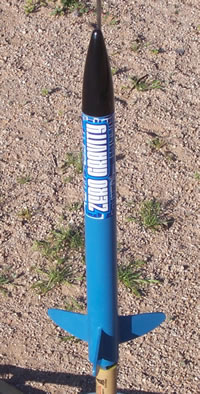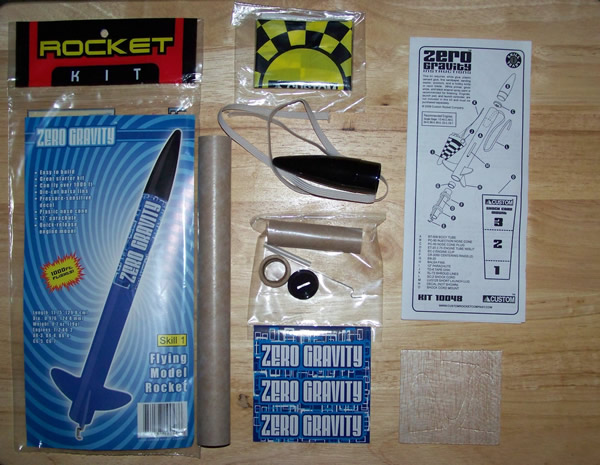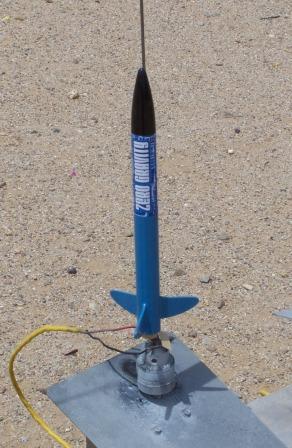| Construction Rating: | starstarstarstarstar_border |
| Flight Rating: | starstarstarstarstar_border |
| Overall Rating: | starstarstarstarstar_border |
| Published: | 2010-08-24 |
| Diameter: | 0.98 inches |
| Length: | 11.75 inches |
| Manufacturer: | Custom Rockets  |
| Skill Level: | 1 |
| Style: | Sport |

Brief:
The Custom Rockets Zero Gravity rocket (Kit #10048) is a single stage, three fin, plastic
nosecone rocket that uses a 12" parachute recovery system and a standard 1/2A, A, B, C, rocket motor (18mm). A
fairly typical or basic level 1 experience rocket.
Construction:
The kit uses a single 9" body tube, a black plastic nosecone, three balsa wood fins,
1/8" launch lug, a standard ABC or 18mm motor mount, and an elastic shock cord which is attached using the Estes
tri-fold method to the top of the body tube during construction. For recovery it uses a 12" plastic parachute that
comes with tape disks and shroud lines to assemble it. The parts list as shown on the instructions are as follows:
- BT-509 Body Tube
- PC-50 Injection Nose Cone
- PC-50 Nose Cone Plug
- ET-20 2.75 Engine Tube W/Slit
- EC-2 Engine Clip
- CR-2050 Centering Rings (2)
- EB-20 (Engine Thrust Block)
- Balsa Fins
- 12" Parachute
- TD-6 Tape Disks
- SL-72 Shroud Lines
- SC-2 Shock Cord
- Lug125 Short Launch Lug
- Decal
- Shock Cord Mount

The instructions had some good points and some areas where they could be improved. What is nice is when it talks about using a pencil instead of an ink pen to make the alignment lines on the body tube, and to mention not to press too hard drawing them or you'll end up making impressions in the cardboard tube. It uses a fin template where you stand the tube on top of it to mark the fin positions. A wrap around one would have been better, but this will work. The template should also show a spot where you draw the line for the launch lug but it doesn't. This is important because you use the line you draw to align the launch lug on the rocket body. The launch lug is normally half way between two of the fins on most models, and in this case, 3" from the bottom of the rocket. You can estimate this yourself and draw that line also. It's not critical to be exactly half way between fins, just do the best estimate you can and that should be close enough. Another point that should have been made is to use a door jamb to draw the lines if you don't have anything better to draw them with. Put the tube in the door jamb and use the wood as a guide to draw a straight pencil line for gluing on the fins and launch lug. It's important these lines are straight so your fins and launch lug will be straight. The remaining section of the instructions are done well. For sanding sealer I use white glue (diluted with water) with micro balloons mixed in it. The micro balloons look like brown powder that you mix in the glue, I've also seen white "balloons" or powder also. I've heard you can also use talcum powder mixed with the glue, but I've never personally tried it so I can't say if it works. I got my micro balloon powder online, but I've also seen it in hobby stores. I think Hobbylinc (online) sells it also. You simply dilute the white glue (Elmer's, etc.) about 50/50 with water and then mix in some micro balloon powder. White school glue is already somewhat diluted so you may use less water. Mix it together and paint it onto the balsa with a paint brush like it was paint. When dry, just sand it smooth and repeat until there are no wood grain lines left. This method doesn't smell like petroleum based fillers, and the water is the thinner/cleaner for the white glue. I usually give a final single coat of glue without the powder just to make it smoother. This is only one method of filling in the balsa grain, and the one I personally use. The instructions go over how to fold the parachute and launching procedures. That's nice to have besides just saying how to build the rocket. The illustrations are well done also. One more thing, if the black nose cone is glossy enough for you, I wouldn't paint it. I've had a somewhat difficult time painting the nosecone. I seem to get a reaction of the plastic to paint, and you may have to sand it and repaint it a few times to get it glossy and smooth again. It's not hard to do, it just takes more time. The same paint goes on great on the rest of the rocket.
The kit was easy to build. On some kits the balsa fins may need more filling and sanding than others according the the grade of balsa and how it was cut. I didn't have any problems with this kit. If you have dents or voids to fill you can use wood putty or in my case, Squadron putty for filling in the pockets. Squadron putty (available in hobby shops) is also good for filling in spots on plastic nose cones. I used to use it on plastic models, but it works on balsa and body tubes also. You put it on, wait for it to dry, and then sand it smooth. The nose cone fit fine, it it's loose just add a piece of masking tape to the nosecone shoulder (the part that goes into the tube) so it isn't loose anymore.
I modified my kit by tying a length of Kevlar® thread around the motor mount tube, and then slide the upper centering ring over it. The Kevlar® is long enough to extend past the top of the body tube and at the end of the Kevlar® I tie a fishing snap swivel. The shock cord is then tied to the fishing snap swivel and the nosecone. The shock cord I used is 1/8 inch wide and three feet long elastic available in any sewing department. Some rocket companies use the round thread elastic. The parachute is attached to two fishing snap swivels attached back to back so either end has a snap. One snap is around the shroud lines of the parachute, the other is attached to the nosecone. This makes it very easy to remove the parachute and untangle it. The swivel on the shock cord allows the cord/elastic to be replaced easily if it gets burned or worn by the hot ejection gasses. If you build it with the tri-fold shock cord method it'll fly fine, it's just harder to replace the cord from wear. If you don't use the swivels for the parachute, you'll eventually have to spend some time getting the tangles out. You can get the Kevlar® line from online hobby stores, but Quest Aerospace, the people who make the rockets, also sell the Kevlar® separately. I think mine is 140 pound test. It's like string or thread in size, but it takes the heat and wear better. Don't use regular thread or string for the Kevlar®, they are not the same!
Finishing:
I usually spray a coat of gloss clear over the entire model once it's been painted and
decals applied, except the nosecone in my case (It looked fine without painting it). The paint will give the rocket an
even shine over it's length and also tends to seal the decal so it doesn't come up. It's usually more glossy after
you're done. One good thing about this paint scheme is the fact it's just one color since at some point you may have to
glue a fin back on if it has a rough landing. I painted mine with Krylon paint that I bought in Wal-Mart, but you can
get this paint in most stores stocking spray paint. The clear gloss coat is also Krylon. I try to keep the brand the
same when I build a rocket. If you use another brand, stay with that one since there may be compatibility issues if you
mix brands. Ace Hardware brand paint is also good, and I have used it on previous rockets I have made with good
results. It just takes more time between coats of paint.
With this rocket, the decal started to lift at the seam a few weeks later, even after gloss coating it. So, I used some "brush on" type super glue and held the decal down with a toothpick until the glue held. Do this one section or spot at a time, and don't try to do the entire seam at once. Once I did that the decal never came up again. I think I gloss coated one more time to hide the different shine of the super glue at the seam since the rocket was still "brand new" yet.
Construction Rating: 4 out of 5
Flight:
I've flown this with A8-3 motors and it goes high enough for me with this motor. It's a
light rocket so it doesn't need a big motor, but if you do use a "C" motor, it'll go way up there. Since it
has a motor clip, you don't have to use the friction method to keep the motor in the rocket, and it's quicker to change
motors and less trouble for young rocketeers. I've gotten smooth straight flights when I've flown it. On one of my
flights I had a rare case where the rocket nozzle was bad, but even then it still ejected the parachute and came down
softly. I use about 4 to 5 sheets of wadding when I fly it.
Recovery:
The longer shock cord really helps. After you're finished tying knots it's a little shorter
than 3 feet. The elastic may possibly get damaged by the ejection charge (frayed or burnt) over time, that also depends
on how much wadding you use when you fly it. Being able to replace it easily is a plus if you use a snap swivel. After
three flights the rocket is still like new and the shock cord is in great shape. It came down reasonably fine for me on
a 12 inch parachute. I don't have any complaints. Since the fins are away from the motor exhaust nozzle they don't get
damaged by the exhaust heat and they are a little more robust when landing since they aren't the first thing that hits
the ground when it lands with a parachute.
Flight Rating: 4 out of 5
Summary:
This is a well made rocket that is easy to build. It's comparable to the Estes Alpha which is a
good rocket also. This is also a sister to the Custom Rockets Atomic Rocket. The only difference is that the Atomic has
six fins, the Zero Gravity has three. You'll get the Zero Gravity flying faster since there are only three fins to
glue, sand and seal. Younger rocketeers will probably have an easier time with the Zero Gravity because it has less
fins. It flies well and is affordably priced. The instructions missed the launch lug position on the fin template, and
it should have mentioned that you can use a door jamb to draw straight lines for the fins and launch lug. However they
do have a few good points such as using pencil to draw the lines and goes on to mention how to fold the parachute and
how to launch the rocket. It needs a different shock cord than the one that comes with the kit, so I just replaced it
with a 3 foot long piece of 1/8 inch elastic. It's a good flying rocket, easy to build and affordably priced that comes
with a parachute. One more thing, it has a body tube that is almost 1 inch in diameter, and that makes it easier to
pack the parachute and shock cord.
Overall Rating: 4 out of 5
Other:
It's a fun rocket to launch and fly!
Other Reviews
- Custom Rockets Zero Gravity By Alan Boldt (July 31, 2010)
Brief: Easy to build kit with plastic nose cone, die-cut balsa fins, and 12" parachute. Construction: 1 - 9" BT-50 Body Tube 1 - Plastic Nose Cone 1 - 18mm Engine Tube 1 - Engine Hook 2 - Centering Rings 1 - 18mm Engine Block 3 - Balsa Fins 1 - 12" Plastic Parachute 1 - Elastic Shock Cord 1 - 1/8" ID Launch Lug 1 - Wrap ...
 |
 |
Flights
 |
 |